… no concerts going on, and no sports to watch on TV. So you have no excuse to not read something you might learn something from.
I Don’t Know What To Call This Damned Thing (Just Read it Please!!!) ~ Neal
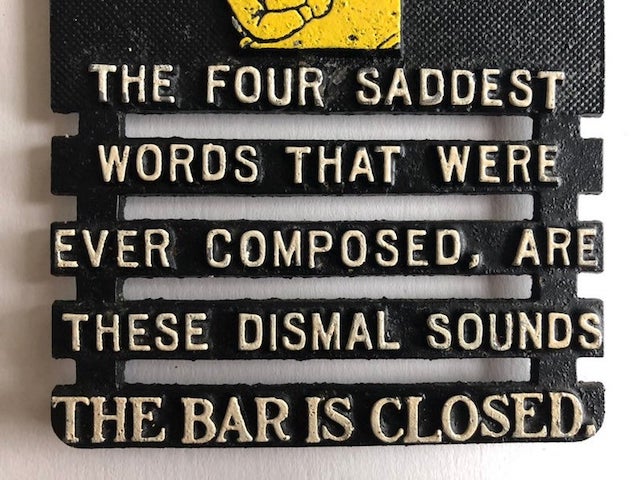
It is sad, (and I was just as guilty of this for a long period of my life), that people exhibit such a lack of interest in the history of their country. This is sad for two reasons; the first being that there is so much to learn from that history, and the second being how relatively easy it is to find that history now that everyone has a portable library in the hand all the time; i.e. their cell phones.
The internet is a vast place, filled with all kinds of things, and without a guide to point you in the right direction it is like walking into a huge library without a librarian, or a card catalogue telling you the location of the book you’re looking for. On top of that, anyone can post anything they want on the internet, (except for death threats or plans to build nuclear weapons), and that gets tossed into the mix; so it’s hard to tell if the information you are getting is accurate or not.
The best way to get at the truth regarding the history of our country, the nature of our Constitution and the men who wrote it, is to go to the horse’s mouth, so to speak; to seek out source documents from the period you are studying.
The problem arises when you don’t know what you’re looking for to begin with. Then there is the problem of learning of the existence of a particular document, or event for that matter, and then finding that it is like the hub of a bike wheel with spokes, or tendrils, leading off in every direction. I can’t count the times I’ve looked for a specific document, only to find myself discovering web pages filled with other documents or speeches by the author of the document I was looking for. It is very easy to get lost amidst all that information when you don’t know exactly what it is you’re looking for.
I have been very lucky, (one might even call it providence), to have encountered people at crucial junctures along this journey of self-education who have guided me through the maze of information and pointed me towards the truth. Had these people not come into my life when they did I would probably still be wandering around in intellectual darkness without a clue as to what I was looking for; not to mention my inability to comprehend the things I was discovering. You see, not only did these people point me in the right direction, they also taught me how to think; a skill I was not very proficient at.
Depending upon what side of an issue I come down upon, people sometimes ask me if I’m a Republican, a Democrat, or an Independent. I always say, “None of the above; I’m a seeker of the truth, and the truth doesn’t belong to a political party.” I guess what you could call me is a truth junkie, and I’ve been fortunate to find someone who gives away free fixes. I won’t go so far as to say that this person is the smartest and most knowledgeable person on the planet, (he’d probably deny it anyway), but I will say he is the most knowledgeable person I’ve ever met; and his name is Mike Gaddy. Mike’s philosophy is, “Knowledge not shared is knowledge lost.”

Mike Gaddy
What Mike’s gift is, above and beyond his vast collection of historical data, is his ability to teach in such a way that you are gently guided towards the truth in a manner that causes you to think for yourself. Also Mike doesn’t hit you with facts to you by the dump truck load; hitting you with more than you’re capable of processing; he leads you along by giving you just enough information to whet your thirst; causing you to do the research and thinking to discern the truth.
My biggest gripe against people today is that they refuse to dedicate even a minute portion of their day studying the past. People will spend hours playing video games, watching mindless sitcoms or Reality TV shows, watching sporting events, but they won’t spend an hour a day reading something that might help them understand how come our country is so screwed up these days.
Instead of researching things for themselves; using their minds for their intended purpose, they would rather take the words of political pundits, or those actively engaged in depriving them of their liberty – their elected officials. With the vast amount of information, (some of which is slowly vanishing off the internet), one needs a guide to navigate what’s out there; help them distinguish fact from fiction; information from misinformation.
Without that guide one may as well put a blindfold on and search for a needle in a haystack; and as far as I’m concerned Mike Gaddy is a world class guide – and I’m both proud and grateful that he has taken me under his wing. I don’t mean to make this a tribute to Mike; I just needed to say that so that you’ll understand that without his help I would never be where I am right now; and I’m eternally grateful that I met him.
People seem to think that our system of government, along with the document that established it, is the best system the world has ever seen. I’m not going to argue either in support of, or in opposition to that belief for the time being. What I want to do, instead, is to have you read something first; something written by John Adams when he was asked by North Carolina to provide his thoughts on how to establish a ‘good’ government for themselves.
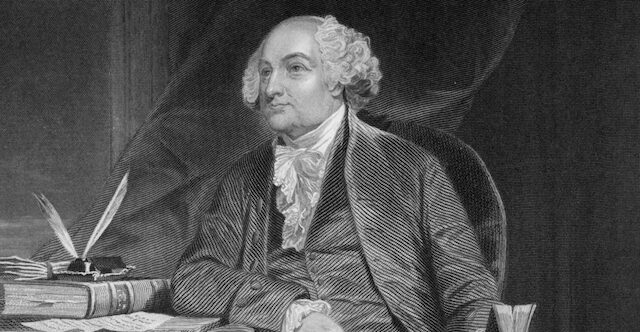
John Adams
The pertinent question Adams brings up is, “We ought to consider what is the end of government, before we determine which is the best form.” When Adams asks what the end of government is, he is asking what purpose government should serve. Only after determining what purpose government should serve can one decide which form of government best serves that end.
If we are to assume that the Declaration of Independence is the cornerstone of our system of government; the foundation upon which it was built, then we must heed what the Declaration of Independence says is the purpose for which all governments are established; that being the securing to all men the rights of Life, Liberty and the pursuit of Happiness.
This brings up two very important points. The first point is, has our system of government adhered to the purposes for which it was established; has it secured to us our rights to Life, Liberty and the pursuit of Happiness? Now if you read that last right – the pursuit of Happiness – there is no guarantee that you’ll find Happiness; only that you are free to pursue it. People, often fatally for their liberty, believe that the purpose of government is to provide them with happiness; along with comfort, security, and sustenance.
I’m sorry, but that’s wrong. The purpose of government is to ensure that no one puts up obstacles to you so that your right to pursue happiness, comfort, and security are not restricted by anyone else; it is your responsibility to obtain those things; provide them for yourself. The sad thing about it is that government, (and this is becoming increasingly evident with the current Coronavirus scare), is the one erecting barriers to your ability to pursue happiness. After all, you can’t pursue happiness if you’re told you must remain locked away inside your home.
The second point, and this is where I will devote the remainder of my time, is; was this system of government the best form which could have been established to secure the blessings of Life, Liberty and the pursuit of Happiness; for I believe it was not.
I could almost write a book with the knowledge I’ve acquired on the character and motive of those we call the drafters of our Constitution, (most of it having been provided by my friend Mike), but I would like to focus my attention upon one aspect of this constitution that was not discussed when I went through social studies in high school; the ability of a centralized government to effectively represent the wants and needs of a large country such as ours.
One of the questions brought up by those opposing the ratification of the Constitution was in reference to whether the system being proposed could effectively serve the needs of such an extensive nation. Many of the Anti-Federalist writers brought this subject up in their writings, but for brevity’s sake I’ll just quote from Samuel Bryan, writing as Centinel, “…if the united states are to be melted down into one empire, it becomes you to consider, whether such a government, however constructed, would be eligible in so extended a territory; and whether it would be practicable, consistent with freedom? It is the opinion of the greatest writers, that a very extensive country cannot be governed on democratical principles, on any other plan, than a confederation of a number of small republics, possessing all the powers of internal government, but united in the management of their foreign and general concerns.”
When the Constitution was ratified the United States was nowhere near as large, nor populated, as it is today. For instance, the distance from Georgia to Maine was only 1,300 miles and the total population of America, not including Native American Indians, was only 3.7 million. Hell, California alone has ten times that many people living in it today.
At the time the first Congress went into effect there were 65 members in the House of Representatives; giving the people 1 representative for every 57,169 people. How is one representative supposed to be familiar with the wants and needs of 57,000 plus people?
The contiguous United States; meaning the States sharing common borders, expands from the Atlantic Ocean on the east all the way to the Pacific Ocean on the west. The distance from California to our nation’s capital is twice as far as the distance from the northernmost State in 1789 to the Southernmost State. Furthermore, the population of America has increased a hundredfold since 1789; with the last census recording over 320 million people living in this country. Yet there are only 435 members in the House of Representatives; giving us the ratio of one representative for every 747,000 people.
If you were to put 100 people in the room and ask them to come up with measures that best suited the wants and needs of all of them, you’d be lucky if you could get them to agree on anything; that’s how divided people are on their beliefs and ideologies. Yet you expect one representative to be able to effectively know, and be able to represent, what 747,000 people want or need? Are you nuts; it ain’t gonna happen; not now, not ever?
What ends up happening is that people align themselves behind a political party that comes closest to promising to do things that they support or believe government should be doing; with the result being that the lives, liberty and pursuit of happiness are subject to the whim of a majority of the people; in other words an elective democracy. What about those whose rights and liberty are being infringed upon by the majority; or those who want no part of this government altogether; don’t their rights matter?
When one asks what is the best form government should take to preserve and protect the rights of the people I fear people often assume I am limiting my question to whether that system should be a democracy, a republic, or socialist or communist for that matter. However there is a little discussed aspect of that question that needs to be discussed if we are to come the an understanding of whether our current system is, in fact, the best that could have been obtained.
The subject which I am speaking is whether or not a federal or a national system is best for a country as large and populated as ours is. I know a lot of people believe the two mean the same thing; they are interchangeable; but they aren’t, and its crucial you understand the differences between the two.
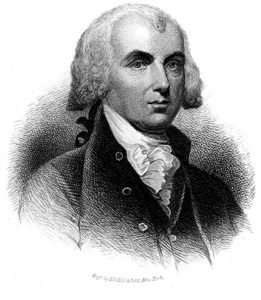
James Madison
During the debates that produced the Constitution James Madison took notes of the daily proceedings; which were open to public viewing upon his death, (giving him plenty of time to edit and re-edit them as he pleased). Nonetheless, on June 19, 1787 Madison addressed the convention and said, “One characteristic, was that in a federal Government, the power was exercised not on the people individually; but on the people collectively, on the States. … The other characteristic was that a federal Govt. derived its appointments not immediately from the people, but from the States which they respectively composed.”
A federal government, without going into too lengthy an explanation, is one that is created by and acts upon the sovereign states composing the republic. A national one, on the other hand, is one that derives its authority directly from the great body of the people, and whose power extends directly to them. There is much more to it than that, but those are the basics.
We had a purely federal form under the Articles of Confederation; 13 sovereign and independent States which had established a system of government to serve them collectively under a ‘union’ of States. Whether that system could meet the needs of the country is another question altogether; and one that I won’t bother going into at this time.
The point is, we had a federal form of government, and the delegates who went to Philadelphia in 1787 were ONLY given the authority to propose modifications to that federal form of government so that it could more effectively serve the sovereign and independent States; not create a national form to replace the existing federal form.
It’s interesting to note that in Federalist 39 James Madison would write, “If we resort for a criterion to the different principles on which different forms of government are established, we may define a republic to be, or at least may bestow that name on, a government which derives all its powers directly or indirectly from the great body of the people, and is administered by persons holding their offices during pleasure, for a limited period, or during good behavior. It is ESSENTIAL to such a government that it be derived from the great body of the society, not from an inconsiderable proportion, or a favored class of it.”
I say it’s interesting that Madison would say that because if you were to look at those who drafted the Constitution, and those who were among its primary supporters, you would find that they were from a favored class of society and did not represent the common people it was supposedly established to represent. Just some food for thought for you there…
Getting back to the point at hand, is our system federal or is it national; or is it a hybrid containing a little of both? Well the House of Representatives represents us, the people; making that aspect of it national. Then we had the Senate; which was to represent the States; making that aspect of it federal; something that was done away with when the 17th Amendment was ratified; meaning Congress is now 100% national in nature.
Even though, at the time it was written, the Constitution was a mix containing both federal and national features, it was supposedly limited in the scope of its authority; or at least that’s what James Madison told the people in Federalist 45, “The powers delegated by the proposed Constitution to the federal government are few and defined. Those which are to remain in the State governments are numerous and indefinite. The former will be exercised principally on external objects, as war, peace, negotiation, and foreign commerce; with which last the power of taxation will, for the most part, be connected. The powers reserved to the several States will extend to all the objects which, in the ordinary course of affairs, concern the lives, liberties, and properties of the people, and the internal order, improvement, and prosperity of the State.”
That, at least upon first glance, sounds like Madison was describing a federal form of government; one whose powers would not directly affect the lives, liberties and properties of the people. Yet we know, or at least I hope we do, that that does not describe our current system of government; as its power does extend to our lives, liberty and property. So how did that happen?
Well there are certain passages; Clauses, found within the Constitution which could be, and were, interpreted to give the government ‘implied’ powers; powers that were not specifically mentioned, but were nevertheless assumed to be there, (and I think this was intentionally done by those on the Committee of Style who actually wrote the document).
The Anti-Federalists who opposed the Constitution did their best to warn the people of these hidden dangers, but the opposition to their efforts was such that they could not get the word out, or the people were so fearful of what would happen if they did not ratify it, that their warnings went unheeded. The best they could do was to get the supporters of it to agree to add a Bill of Rights to it once the government it outlined went into effect.
The amendment in the Bill of Rights which sought to limit government power, and preserve that held by the States, is the 10th Amendment, which states, “The powers not delegated to the United States by the Constitution, nor prohibited by it to the States, are reserved to the States respectively, or to the people.”
Yet that is not how the proposals for what would become the 10th Amendment read when they were submitted to Congress. Many of them were worded similar to this, “The powers not expressly delegated to the United States by the Constitution, nor prohibited by it to the States, are reserved to the States respectively, or to the people.”
If you’ll notice the two are quite similar; in fact the only difference is that the proposals by the States contained the word expressly, while the one that was submitted to the States for ratification did not. Madison intentionally deleted the word ‘expressly’ because he did not want the government tied down by it; he wanted those loopholes to remain intact; to be exploited later so that government could gradually expand its power beyond the powers that were promised it would exercise during the ratification process.
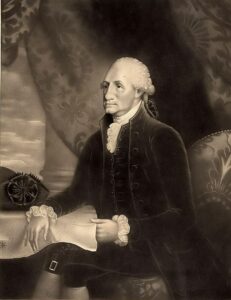 So what we have now is a government that is purely national and one that has nearly unlimited power due to its interpretation of Clauses such as the Commerce Clause, and the Necessary and Proper Clause. All the power and authority is now centralized in Washington D.C.; while the States are mere subsidiary branches of that central authority. Hell, Madison told George Washington that is exactly what he wanted before the Constitutional Convention even convened, “Conceiving that an individual independence of the States is utterly irreconcileable with their aggregate sovereignty; and that a consolidation of the whole into one simple republic would be as inexpedient as it is unattainable, I have sought for some middle ground, which may at once support a due supremacy of the national authority, and not exclude the local authorities wherever they can be subordinately useful.” (Source: James Madison to George Washington, April 16, 1787)
So what we have now is a government that is purely national and one that has nearly unlimited power due to its interpretation of Clauses such as the Commerce Clause, and the Necessary and Proper Clause. All the power and authority is now centralized in Washington D.C.; while the States are mere subsidiary branches of that central authority. Hell, Madison told George Washington that is exactly what he wanted before the Constitutional Convention even convened, “Conceiving that an individual independence of the States is utterly irreconcileable with their aggregate sovereignty; and that a consolidation of the whole into one simple republic would be as inexpedient as it is unattainable, I have sought for some middle ground, which may at once support a due supremacy of the national authority, and not exclude the local authorities wherever they can be subordinately useful.” (Source: James Madison to George Washington, April 16, 1787)
If you’ll recall, when I began this discussion I provided that quote from John Adams regarding what the end of government should be before one determines what the best form that government should take. The question I want you to ask yourself now is; if the preservation of our right to life, liberty and the pursuit of happiness is the end for which governments exist, then is this government we have today serving that end, or is it in opposition to it?
It’s a simple question; especially if you look at it this way; do you have less freedom now than you did 10…20…30 years ago; assuming you are old enough to remember life 30 yrs ago. Are your rights more secure today than they were just a few short decades ago? If you cannot answer yes to both of those questions, then the government we have IS NOT serving the ends for which we were told it would serve; as found in the preamble, (and I won’t even go into a discussion of that), “We the People of the United States, in Order to form a more perfect Union, establish Justice, insure domestic Tranquility, provide for the common defence, promote the general Welfare, and secure the Blessings of Liberty to ourselves and our Posterity, do ordain and establish this Constitution for the United States of America.” (My emphasis)
If government is not serving those ends, then it is not doing what it was established to do; and if it is not, then why do so many of you still think that voting is going to change any of that? I’m 61 years old now; quickly approaching 62, and people have been voting my entire life; yet our liberty and rights continue to be eroded away by laws, regulations, and taxes. So how has voting prevented that from happening, or reversed that trend? Could you PLEASE explain to me how voting has made us freer?
If liberty is the end for which governments are established, and if government no longer serves that end, there is an answer; but most people do not want to hear it. The answer is found in the Declaration of Independence, “That whenever any Form of Government becomes destructive of these ends, it is the Right of the People to alter or to abolish it, and to institute new Government, laying its foundation on such principles and organizing its powers in such form, as to them shall seem most likely to effect their Safety and Happiness.”
Oh, but we can’t do that Neal, it’s illegal to talk about overthrowing the government. It is? Who says so; the government? You’re right, it’s right there in black and white in 18 U.S.C. § 2385, “Whoever knowingly or willfully advocates, abets, advises, or teaches the duty, necessity, desirability, or propriety of overthrowing or destroying the government of the United States … Shall be fined under this title or imprisoned not more than twenty years, or both, and shall be ineligible for employment by the United States or any department or agency thereof, for the five years next following his conviction.”
But, doesn’t the Preamble say that we the people created, or at least ordained and established, this government? Does that not mean that we the people can undo what we have done and abolish this government if we decide we no longer like it? After all, they work for us, don’t they; that whole elected REPRESENTATIVE thing.
But they tried that Neal, and they lost; which means that it is illegal to either overthrow the government or to try and leave the Union. Is that so? So if someone bigger and stronger than you comes up and punches you in the face, just because they are stronger than you their size and strength makes it LEGAL for them to do so? I’d love to hear a defense lawyer try that theory out in a court of law.
Now I’m gonna provide a few quotes on this, but I’m going to withhold telling you who said them…for the time being. I don’t want to influence your thoughts on these quotes by providing the names of those who spoke them; just read them for now and let them sink in.
This country, with its institutions, belongs to the people who inhabit it. Whenever they shall grow weary of the existing Government, they can exercise their constitutional right of amending it, or their revolutionary right to dismember or overthrow it.1
Any people anywhere, being inclined and having the power, have the right to rise up and shake off the existing government and form a new one that suits them better. This is a most valuable, most sacred right- a right which we hope and believe is to liberate the world. Nor is this right confined to cases in which the whole people of an existing government may choose to exercise it. Any portion of such people that can, may revolutionize and make their own, of so much territory as the inhabit.2
Again, if the United States be not a government proper, but an association of States in the nature of contract merely, can it, as a contract, be peaceably unmade, by less than all the parties who made it? One party to a contract may violate it — break it, so to speak; but does it not require all to lawfully rescind it?3
I will give you a hint though; all 3 of the above quotes were made by the same person. Now let’s look at that last one for a moment. If the Constitution is, as the author suggests, a contract; and that it takes all the parties of a contract to unmake it; does that mean that every State in the Union would have to agree to disbanding the Union, or abolish the government?
Well here are a few more quotes for you to consider as well; and I’ll tell you later who said these ones.
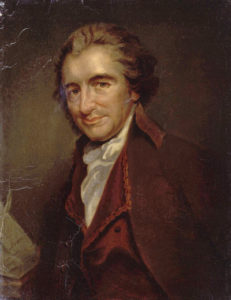
Thomas Paine
– There never did, there never will, and there never can, exist a Parliament, or any description of men, or any generation of men, in any country, possessed of the right or the power of binding and controlling posterity to the “end of time,” or of commanding for ever how the world shall be governed, or who shall govern it; and therefore all such clauses, acts or declarations by which the makers of them attempt to do what they have neither the right nor the power to do, nor the power to execute, are in themselves null and void.4
– The Constitution has no inherent authority or obligation. It has no authority or obligation at all, unless as a contract between man and man. And it does not so much as even purport to be a contract between persons now existing. It purports, at most, to be only a contract between persons living eighty years ago. And it can be supposed to have been a contract then only between persons who had already come to years of discretion, so as to be competent to make reasonable and obligatory contracts. Furthermore, we know, historically, that only a small portion even of the people then existing were consulted on the subject, or asked, or permitted to express either their consent or dissent in any formal manner. Those persons, if any, who did give their consent formally, are all dead now. Most of them have been dead forty, fifty, sixty, or seventy years.5
If we consider the federal union as analogous to the fundamental compact by which individuals compose one Society, and which must in its theoretic origin at least, have been the unanimous act of the component members, it can not be said that no dissolution of the compact can be effected without unanimous consent. A breach of the fundamental principles of the compact by a part of the Society would certainly absolve the other part from their obligations to it.6
So on the one had we have one of these men saying it would take a unanimous resolution by all the members of the Union to dissolve the Union, and in the other we have a man saying that if the fundamental principles of the compact were violated it would justify in absolving the other partners to the compact from their allegiance to the Union.
So which of those opinions are right? Well I suppose it would depend on who said them, when in our countries history they were said, and what they were said in reference to. I won’t tell who said them yet, but numbers 1, 2, 3, and 5 were said in the mid 1800’s; before and after the Civil War occurred. Number 4 was written right after the Constitution was ratified, and Number 6 was written during the period that saw the Constitution being debated amongst the States.
An argument could be made that No’s 1, 2, 3, 5, and possibly even No. 4 could be interpretations of what powers the Constitution granted the government, and which ones were reserved to those who created and adopted the Constitution. As No. 6 was spoken during the period which saw our Constitution being debated, it might be the only one that actually comes close to being truthful.
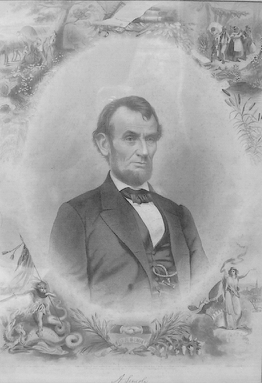 So who said those quotes? Well, numbers 1, 2 and 3 were spoken by none other than Abraham Lincoln himself; the first and third ones coming from his Inaugural Address, and the second one coming from a speech he gave in regards to the war with Mexico in 1848.
So who said those quotes? Well, numbers 1, 2 and 3 were spoken by none other than Abraham Lincoln himself; the first and third ones coming from his Inaugural Address, and the second one coming from a speech he gave in regards to the war with Mexico in 1848.
No. 4 comes from Thomas Paine’s book, The Rights of Man, written shortly after the Constitution was ratified; No. 5 comes from Lysander Spooner’s book No Treason; written shortly after the Civil War ended; but it is the last one that is the kicker.
The sixth quote comes from none other than James Madison; the Father of our Constitution, and he said it on June 19, 1787 during the debates that produced the Constitution; (if you can trust the accuracy of his record of those proceedings that is. So the man who is preeminently responsible for the Constitution is saying that if any part of a union violates the fundamental principles of the compact that formed the union, then that would absolve the others from allegiance to the Union.
The problem is, who would decide whether there had been a violation of the fundamental principles of the compact; the Supreme Court? Isn’t that like letting crime bosses sit on the jury for a trial where one of the other crime bosses was on trial for breaking the law? If you actually think the Supreme Court is going to rule in favor of a State dissolving the bonds that hold it to the Union, you may want to brush up on the American Revolution; for no system of government ever willingly lets go of the powers it holds over its component parts…NEVER.
I’m a firm believer in the principle of, that government is best which governs the least, or not at all. However, I’m also a realist and I recognize that men can be bad and seek to infringe upon the rights and property of their fellow men; thereby necessitating some form of government to secure those rights against infringement. However, no matter what form government may take, it should have, as its underlying reason for existing, the securing of the rights to life, liberty, property and the pursuit of happiness of all the people…EQUALLY. If government cannot, or will not do that I will not support it, and neither should you.
Any government, especially one that claims to derive its power from the people, that turns around and tells the governed that they must submit to its authority for all time, is a government that has forgotten its place; has forgotten that governments derive their just authority from the consent of the governed, and that when any government becomes destructive of the ends for which it was instituted, it is the right of the people to alter or ABOLSIH it.
All government, even the best ones, eventually devolve into some form of despotism; as those in government constantly seek to expand their power over the governed, at the cost of the rights and liberty of those they govern. Ours is no exception. The only way to forestall, and possibly prevent that from happening, is to establish a system where the power is not centralized in one location; often at great distances from those it governs.
If you recall, towards the beginning of this rant I began by discussion the ratio of representation in our existing system of government. With the majority of the political power now held by the central government, it has no idea what the wants and needs of the small communities are; it bases its decisions upon a majority of the people; often at the cost of the liberty of small groups.
A truly good system, which has in mind the liberty and welfare of the governed, should have the most power held by those closest to the governed; with diminishing power being held the further one gets from the local communities. I think this graphic may help explain what I’m trying to say.
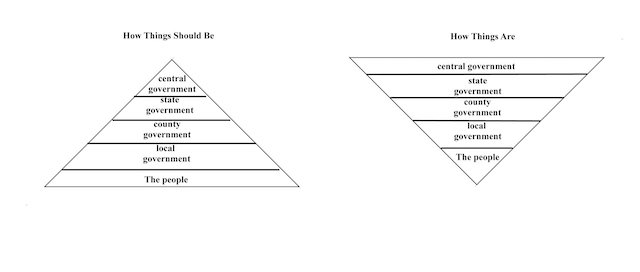
If you’ll notice, the image on the left shows that the people are the base, with the broadest level of power, and with diminishing power as you go up the pyramid. On the one on the right the pyramid is inverted, with the majority of power being held by the central government, with diminishing power going down the pyramid.
Government, good government that is, should limit its power to ensuring that no one tramples upon the rights and liberty of others, and seeks to ensure that all the component parts are in harmony and kept safe from attack by foreign threats. People know what’s best for their lives; at least they should; and it should not be the purpose of government of any kind to babysit and provide for their needs; unless it is a time of crisis; and even then the local government is far more aware of the wants and needs of the people than is some entity 3,000 miles away; where the ratio of representation is 1:747,000.
You can vote all you want and you won’t change the structure of our system of government, and how that structure centralizes all power at the top instead of letting the people, and those closest to them, decide what is best for themselves and their constituents.
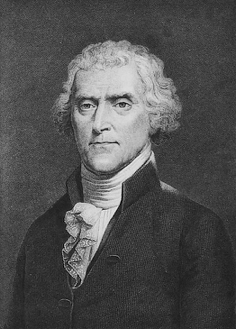
Thomas Jefferson
Thomas Jefferson hinted at such a government in his Inaugural Address, saying, “Still one thing more, fellow-citizens — a wise and frugal Government, which shall restrain men from injuring one another, shall leave them otherwise free to regulate their own pursuits of industry and improvement, and shall not take from the mouth of labor the bread it has earned. This is the sum of good government, and this is necessary to close the circle of our felicities.”
This drew the ire of some; particularly Northern business interests who followed the Hamiltonian philosophy that government should be a tool to increase America’s wealth and industrial might; even at the cost of a certain segment of society.
Yet after 4 years of Jefferson as President, he was able to make the following claim in his Second Inaugural Address, “At home, fellow-citizens, you best know whether we have done well or ill. The suppression of unnecessary offices, of useless establishments and expenses, enabled us to discontinue our internal taxes. These, covering our land with officers and opening our doors to their intrusions, had already begun that process of domiciliary vexation which once entered is scarcely to be restrained from reaching successively every article of property and produce … The remaining revenue on the consumption of foreign articles is paid chiefly by those who can afford to add foreign luxuries to domestic comforts, being collected on our seaboard and frontiers only, and incorporated with the transactions of our mercantile citizens, it may be the pleasure and the pride of an American to ask, What farmer, what mechanic, what laborer ever sees a tax gatherer of the United States? These contributions enable us to support the current expenses of the Government, to fulfill contracts with foreign nations, to extinguish the native right of soil within our limits, to extend those limits, and to apply such a surplus to our public debts as places at a short day their final redemption, and that redemption once effected the revenue thereby liberated may, by a just repartition of it among the States and a corresponding amendment of the Constitution, be applied in time of peace to rivers, canals, roads, arts, manufactures, education, and other great objects within each State.”
Those elected to the presidency each year stand before Congress and thump their chests, proudly proclaiming how great our state of the Union is. None fail to mention that the national debt continues to climb; none fail to mention that more and more people have become dependent upon government handouts, and none fail the mention that the people have fewer rights and less liberty.
If that’s what you want from government, a massive debt, complete reliance upon government for all your wants and needs, and a total loss of your freedom; help yourselves, but count me out. I stand with the remnant of those who fought tyrants, not supported them. I stand with men who live and breathe the motto, Give me liberty or give me death.
In 1787 Thomas Jefferson wrote a letter to James Madison in which he said, “I think our governments will remain virtuous for many centuries; as long as they are chiefly agricultural; and this will be as long as there shall be vacant lands in any part of America. When they get piled upon one another in large cities, as in Europe, they will become corrupt as in Europe. Above all things I hope the education of the common people will be attended to; convinced that on their good sense we may rely with the most security for the preservation of a due degree of liberty.”
I think we all see that that is not the case, that our governments are not agrarian in nature, they favor big business, Wall Street, and big banking institutions. We also see that we have seen that big cities have arisen; filled primarily with those whose principles are corrupted visions of the principle of individual liberty. And finally, we have seen that the people have not been educated; with the majority of them not being able to explain, with any proficiency, the fundamental principles contained in their Constitution.
And we wonder why things are so screwed up. Well hang on to your horsies kids, the funs only beginning; its about to get much worse; and unless you have the courage to shake off the source of your problems, (government), there’s not a damned thing you’ll be able to do about it.
~ References ~
1. Abraham Lincoln, First Inaugural Address, March 4, 1861
2. Ibid
3. Ibid
4. Thomas Paine, The Rights of Man, 1791
5. Lysander Spooner, No Treason: The Constitution of No Authority, 1870
6. James Madison, Notes from the Constitutional Convention, June 19, 1788
April 2, 2020

~ The Author ~
Neal Ross, Student of history, politics, patriot and staunch supporter of the 2nd Amendment. Send all comments to: bonsai@syix.com.
If you liked Neal’s latest column, maybe you’ll like his latest booklet: The Civil War: (The Truth You Have Not Been Told). Life continues to expand for this prolific writer and guardian of TRUE American history.
